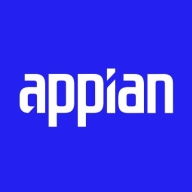

Appian and GitLab compete in the software development space, offering distinct advantages and tools for developers and businesses. Appian appears to have the upper hand in rapid application development with its low-code environment, while GitLab excels in repository management and CI/CD capabilities, attracting developers with its user-friendly interface and workflow optimization.
Features: Appian supports rapid development through its low-code environment, catering to various business needs with its robust forms builder and process modeling capabilities. It provides an integrated architecture that facilitates case management and process-based applications. GitLab stands out for its repository management, CI/CD capabilities, and ease of use through a well-designed interface. It enhances collaboration with code reviews, branch management, and flexible development options.
Room for Improvement: Appian could benefit from enhancing its DevOps integration and offering more flexibility in UI customization. The architecture could be more adaptable, and features like offline capabilities need improvement. GitLab's third-party integrations, especially with non-Kubernetes platforms like AWS, could be strengthened. Improved security integrations and support for large files are also areas for enhancement.
Ease of Deployment and Customer Service: Both Appian and GitLab offer public, hybrid, and private cloud deployment options. Appian is known for strong customer service and technical support, often praised for its responsiveness. GitLab's customer support is positively regarded, though complex issues may take longer to resolve.
Pricing and ROI: Appian is priced higher but is considered to provide good value with its capabilities and ROI potential, despite some confusion over the pricing model. GitLab offers a free version and paid tiers, with the Premium version popular for its feature set. While some users find GitLab expensive, they acknowledge its value, especially for larger teams leveraging its full capabilities. Both products are generally seen as cost-effective with ROI considerations.
Using Appian is saving us five full-time employees, which is significant since we currently have only four team members.
They see return on investment in terms of cost savings, time savings, more efficient processes, and more efficient employees.
Appian is very efficient, allowing us to build a lot of applications within a financial year, making it cost-effective.
Migrating to GitLab is bringing time-saving benefits, and everything is easier to automate.
We have saved time significantly, reducing deployment time from four hours to five minutes per deployment.
I would give Appian's customer support 10 out of 10 due to their next-level support.
Their customer service is responsive, and the team is very prompt for support.
The technical support for Appian rates as 10 out of 10 because they have a great support team.
We have rarely needed to escalate issues to technical support since GitLab usually runs seamlessly.
I have interacted with architects for some advice during the implementation, and they were prompt in their response.
I have had meetings where they taught me, explained things, and provided guidance for starting from scratch.
On a scale of one to 10, Appian rates as a nine for scalability.
Our volume has increased by 20% in the two years since using Appian, and it can handle the increased volume effectively.
Initially, without much coding, I can easily handle five thousand records.
It has all the features required for our coding and deployment needs, which makes it scalable to our changing requirements.
We're transitioning to OpenShift for future scalability with increased user numbers.
For scaling, other deployment options from GitLab's side need to be adopted.
We have tested Appian during peak usage and off-peak times, and we have not experienced any issues such as lagging or system disruptions.
It depends on how it has been designed and how it has been configured.
The stability of Appian would rate as nine, as it's a stable environment.
I have not encountered any performance or stability issues with GitLab so far.
The updates are frequent and demanding, happening at least once a week due to security reasons.
We raised a request with GitLab support, but they were unable to help because they could not find the root cause of what went wrong.
It has room to improve for use cases where the users are public facing, where anonymous users could come to a site and run a business workflow or interact with some data.
Appian can be improved by adding a geo-location tagging feature, which would be really helpful for identifying remitter addresses.
If there is a very complex process that includes a lot of data transitioning and memory-centric processes, it consumes a lot of memory.
It would be beneficial to have a user-friendly interface for setting up these configurations, instead of just writing YAML files.
It is essential to conduct proper testing, such as unit tests and code coverage, within the SDLC pipelines.
GitLab can improve its user interface to make conflict resolution more user-friendly.
Appian provides value for money, is easy to use, has a straightforward setup procedure, and offers great support from the Appian team.
On the pricier side, both Appian and Pega are enterprise-level solutions, placing them on the slightly higher side.
The pricing of Appian is based on the number of users and generally ranges from 70 to 100 USD per user per month.
Even when working in other small organizations, we opted for GitLab as it was cost-efficient.
The pricing of GitLab is reasonable, aligning with what I consider to be average compared to competitors.
The price is high, and it limits user accessibility.
The zero-code integration feature is remarkable, allowing for ease of data transfer and workflow enhancement.
Appian is aiding in leveraging AI technologies in multiple ways: one way is for developers, as they make development efficient and quick by enabling developer co-pilots across various phases of the application, which helps design Appian quickly and provides suggestions along the way.
After switching to Appian, it can extract data from MT103, eliminating the need for manual data entry.
As we implement automated testing and DevSecOps, it speeds up the process by forty to sixty percent.
The Ultimate version offers enhanced features for security scanning through DAST and SAST analysis, which have greatly benefitted our project workflow.
By integrating GitLab as a DevOps platform, we have enhanced agility, improved our time to market, and different teams can work collaboratively on various projects.
| Product | Market Share (%) |
|---|---|
| GitLab | 2.9% |
| Appian | 6.5% |
| Other | 90.6% |


| Company Size | Count |
|---|---|
| Small Business | 20 |
| Midsize Enterprise | 9 |
| Large Enterprise | 42 |
| Company Size | Count |
|---|---|
| Small Business | 36 |
| Midsize Enterprise | 10 |
| Large Enterprise | 43 |
Appian is a unified low-code platform and solution used by businesses to build enterprise applications and workflows. This product adapts to the needs of clients and the technologies they are already using to combine their data in a single workflow and maximize resources. The platform has four main components through which it transforms the work process for companies of various sizes. They are:
Appian is utilized across a diverse set of industries, including automotive and manufacturing, energy and utilities, education, financial services, telecom and media, transportation, retail, insurance, healthcare, and life sciences. The most frequent use cases of Appian are customer journey, governance, risk and compliance, operational efficiency, supply chain, distributed order management, and environmental, social, and governance (ESG) management.
Appian Features
Appian has various features that allow users to create solutions for their businesses. These features can be separated into a few groups according to function, including automation, low-code application development, and integrations and data. Some of the most frequently used features of Appian include:
Appian Benefits
The benefits of using Appian include:
Reviews from Real Users
A practice leader - digital process automation at a computer software company values Appian highly because the product is easy to develop, low-code, and has a good user interface.
Alan G., an advisory board member at Codecon VR, Appian offers a clear application life cycle, easy to learn documentation, and comes with a fundamentals course.
GitLab offers a secure and user-friendly platform for CI/CD pipeline management, code repository control, and collaboration, enhancing development speed and efficiency. It facilitates automation with extensive customization and tool integration, ideal for DevOps processes.
GitLab supports source code management, version control, and collaborative development. It's frequently used in CI/CD processes to automate builds and deployments while integrating DevOps practices. GitLab allows companies to manage repositories, automate pipelines, conduct code reviews, and maintain development lifecycles. The platform supports infrastructure and configuration management, enabling efficient code collaboration, deployment automation, and comprehensive repository handling. Many organizations commit and deploy developed code using GitLab's capabilities.
What are GitLab's most valuable features?In specific industries, GitLab serves as a backbone for source code management and CI/CD implementation. Companies leverage its capabilities for infrastructure management and deployment automation, thus streamlining project delivery timelines. Its ability to handle configuration management and code repositories effectively aids in maintaining development lifecycles, making it a preferred choice for organizations committed to enhancing their DevOps practices.
We monitor all Rapid Application Development Software reviews to prevent fraudulent reviews and keep review quality high. We do not post reviews by company employees or direct competitors. We validate each review for authenticity via cross-reference with LinkedIn, and personal follow-up with the reviewer when necessary.